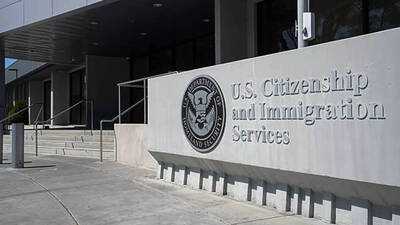USCIS ends cheque, money order payments: What new debit rule means for H-1B and F-1 applicants
In a major procedural shift, the US Citizenship and Immigration Services ( USCIS ) has discontinued payments by cheque and money order for all immigration filings. Beginning this week, applicants must authorise payments through electronic debit using Form G-1650 , which allows the agency to withdraw funds directly from a US bank account.
Speaking to Business Standard, USCIS spokesperson Matthew J. Tragesser said the move reflects the agency’s duty to operate more safely and efficiently. He noted that over 90 percent of past payments were made using cheques or money orders, which often delayed processing and increased the risk of fraud or missed payments. “America deserves better, and we intend to deliver,” Tragesser said.
USCIS spokesperson Matthew J. Tragesser said the move reflects the agency’s duty to operate more safely and efficiently. He noted that over 90 percent of past payments were made using cheques or money orders, which often delayed processing and increased the risk of fraud or missed payments. “America deserves better, and we intend to deliver,” Tragesser said.
Credit card option remains for H-1B filingsFor professionals applying under the H-1B program and other employer-sponsored work visas, Form G-1450 remains available for credit card transactions. This form can also be used for green card applications, travel documents, and employment authorisation requests. Since USCIS begins processing only after successful payment, ensuring accurate banking or card details is now more critical than ever.
Immigration attorneys note that H-1B employers, who frequently file petitions in bulk, may welcome the shift as it streamlines record-keeping and reduces administrative errors. However, it may require additional coordination between company finance teams and legal representatives to ensure that debits are authorized correctly and on time.
F-1 students and new arrivals may face hurdlesThe rule change could be particularly inconvenient for international students on F-1 visas, as many arrive in the US before opening a local bank account. Similarly, newly hired H-1B employees and dependents applying from outside the country may find themselves unable to complete payment if they lack access to a US checking account.
USCIS has cautioned applicants to carefully verify their bank information before submitting Form G-1650. Any incorrect account or routing number could lead to rejection of the case. Applicants are also advised to confirm with their bank that government debits are permitted and that sufficient funds are available to cover all filing fees.
For those without US bank access, prepaid or reloadable credit cards may serve as a short-term alternative, though immigration lawyers warn that these too must meet the agency’s payment authorisation standards.
Global applicants urged to adapt early to avoid delaysImmigration experts say the transition to electronic debit payments represents a broader modernisation of USCIS operations but warn that international applicants must act quickly to avoid disruptions. For H-1B employers and F-1 students, early compliance such as setting up US bank accounts or confirming payment authorisation can prevent costly rejections or processing delays. The change also signals a shift toward a fully digital filing environment, one that prioritises efficiency but leaves little room for manual corrections or late payments.
Speaking to Business Standard,
Immigration attorneys note that H-1B employers, who frequently file petitions in bulk, may welcome the shift as it streamlines record-keeping and reduces administrative errors. However, it may require additional coordination between company finance teams and legal representatives to ensure that debits are authorized correctly and on time.
F-1 students and new arrivals may face hurdlesThe rule change could be particularly inconvenient for international students on F-1 visas, as many arrive in the US before opening a local bank account. Similarly, newly hired H-1B employees and dependents applying from outside the country may find themselves unable to complete payment if they lack access to a US checking account.
USCIS has cautioned applicants to carefully verify their bank information before submitting Form G-1650. Any incorrect account or routing number could lead to rejection of the case. Applicants are also advised to confirm with their bank that government debits are permitted and that sufficient funds are available to cover all filing fees.
For those without US bank access, prepaid or reloadable credit cards may serve as a short-term alternative, though immigration lawyers warn that these too must meet the agency’s payment authorisation standards.
Next Story